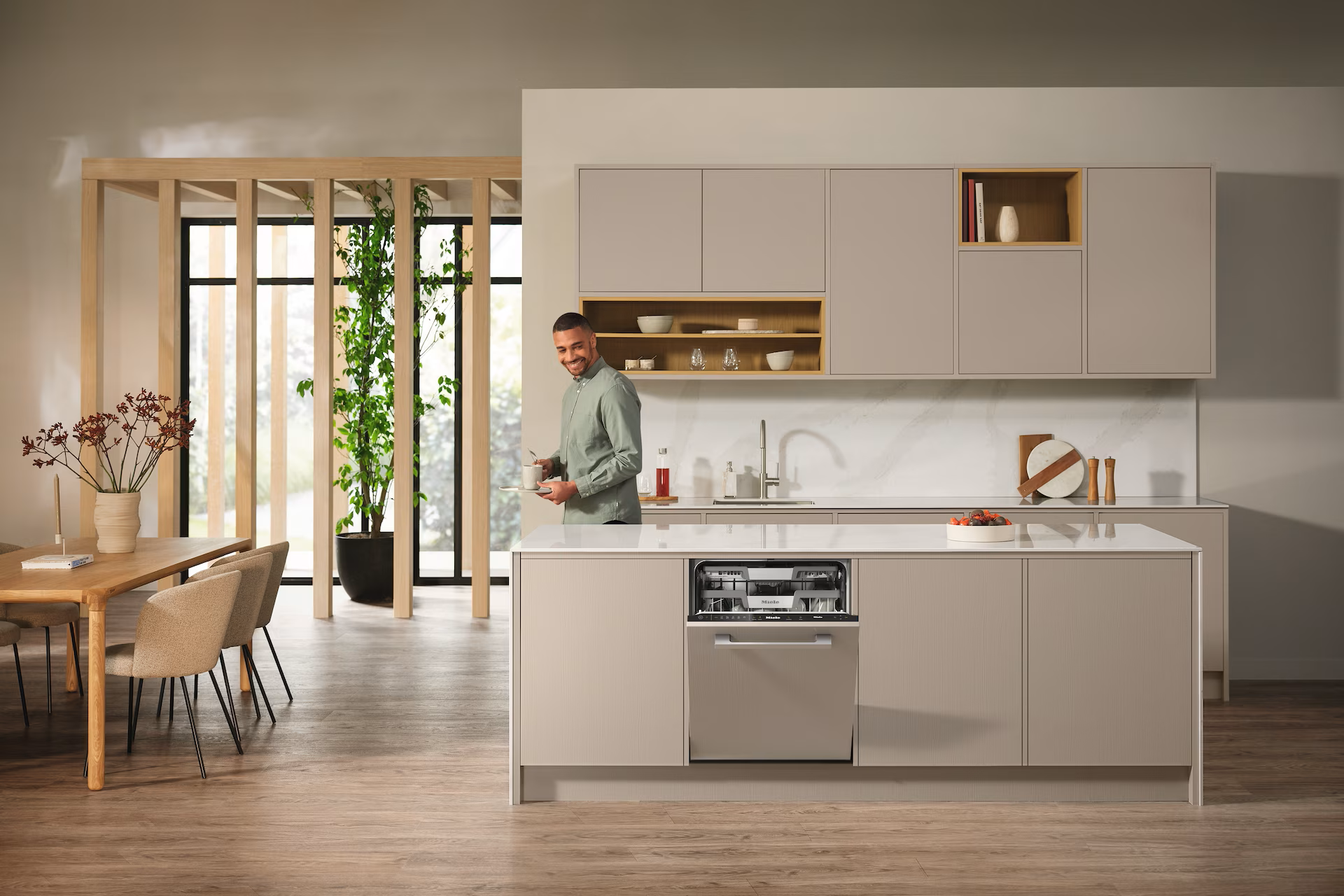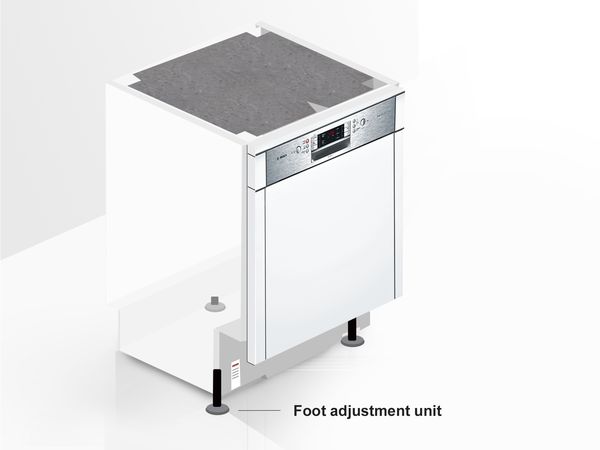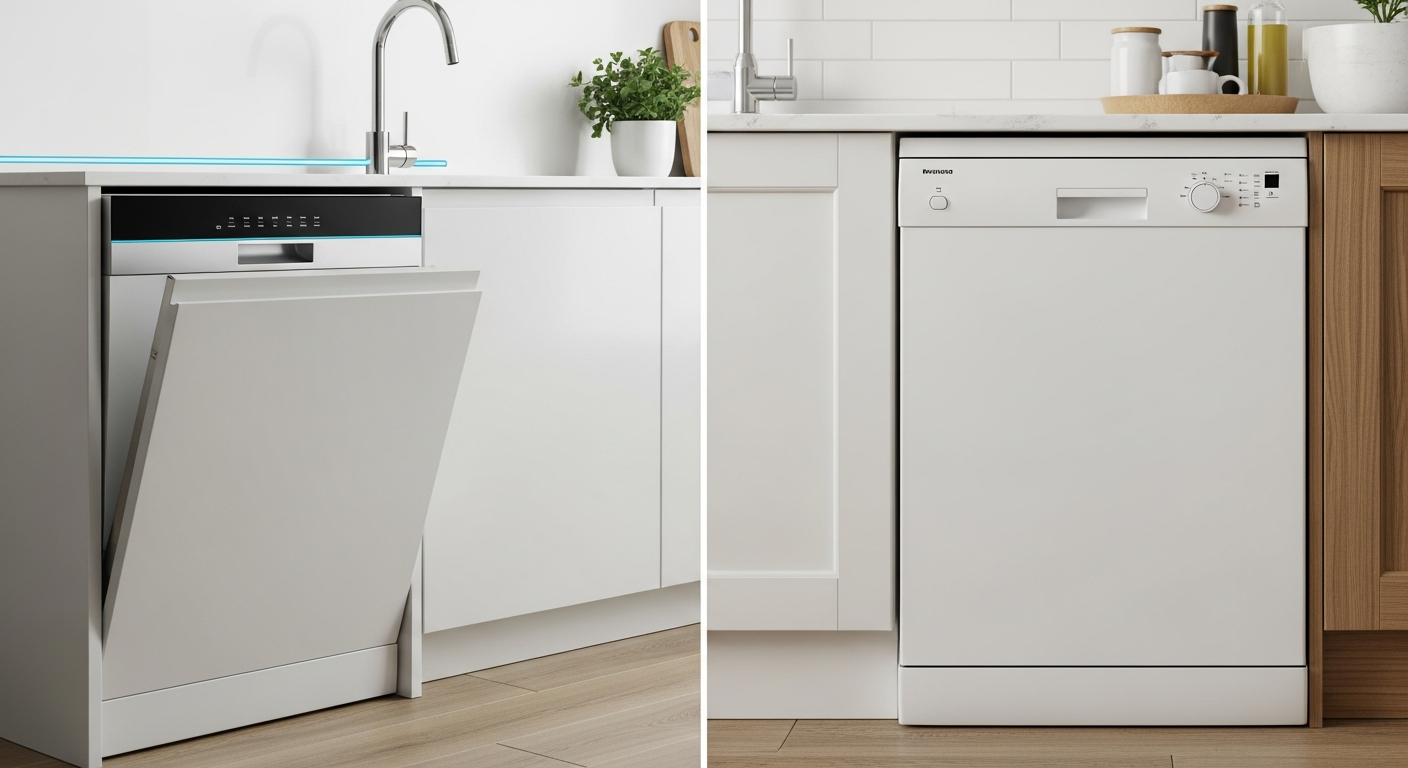Choosing a new dishwasher is rarely as straightforward as it first appears. Beyond the obvious questions about capacity and energy ratings, there's a rather fundamental decision to make: integrated or freestanding? Both will get your dishes sparkling clean, but the right choice depends on your kitchen layout, budget, and how long you're planning to stay put. Let's break down the key differences so you can make an informed decision.
Understanding the Two Types
Before diving into the pros and cons, it's worth clarifying exactly what we're talking about. A freestanding dishwasher is a standalone appliance that can be positioned anywhere in your kitchen with access to water and drainage connections. The front, sides, and top are all finished, making it ready to slot in beside your other appliances or under a worktop. Think of it as the plug-and-play option.
An integrated dishwasher, on the other hand, is designed to disappear into your kitchen cabinetry. It sits behind a cupboard door that matches the rest of your units, creating a seamless, uninterrupted look. There are actually two varieties: fully integrated models have controls hidden on the top edge of the door, whilst semi-integrated versions keep a small control panel visible at the front.

The Case for Integrated Dishwashers
Integrated dishwashers have become increasingly popular, particularly in modern and newly renovated kitchens. Their primary appeal is aesthetic—they create a sleek, uncluttered appearance by blending completely into your cabinetry. If you've invested in a beautiful fitted kitchen, hiding away your appliances can enhance that premium, cohesive look.
But there's more to it than just appearances. Integrated models tend to be noticeably quieter during operation. The surrounding cabinetry provides an extra layer of insulation that dampens sound, which is particularly valuable in open-plan living spaces where kitchen noise can travel into dining and relaxation areas. Whilst a typical freestanding dishwasher might run at around 47-52 decibels, many integrated models operate at 44 decibels or below—quiet enough that you'll barely notice them running.
The cabinet housing also means there are no gaps around the appliance for crumbs, dust, and debris to accumulate, making cleaning around your dishwasher considerably easier. For households with young children, this reduced noise can be especially appreciated during evening cycles when you're trying to settle little ones down for bed.

The Drawbacks of Going Integrated
The seamless look comes at a cost—quite literally. Integrated dishwashers typically start from around £250 but commonly range between £500 and £1,100, with premium models reaching £1,800 or more. Beyond the appliance itself, you'll need to factor in installation costs, which run between £40 and £105 depending on the complexity of the job and whether professional help is required.
Installation is considerably more involved than simply plugging in a freestanding model. You'll need a cupboard door that matches your existing units, and the dishwasher must be precisely fitted and secured to prevent it tipping forward when opened. The door hinges require careful adjustment to ensure smooth operation. Many homeowners find this level of installation warrants calling in a professional, adding to the overall expense.
Another consideration is accessibility for repairs and maintenance. Whilst properly installed integrated dishwashers can be serviced without too much difficulty, getting to them does involve more work than accessing a freestanding model. If you need to replace the appliance entirely, you'll need to ensure the new model fits the existing space and matches your cabinetry—or be prepared to modify your units.
The Appeal of Freestanding Dishwashers
Freestanding dishwashers remain the most popular choice for good reason. They're considerably more affordable, with prices ranging from around £219 to £2,000 depending on features and brand. For most households, a reliable mid-range model can be found for £300-£600, making them accessible on tighter budgets.
Installation is refreshingly straightforward. Most people find they can manage it themselves with basic DIY skills—it's largely a matter of connecting the water supply hose, drainage pipe, and electrical connection. If you'd rather not tackle it, installation services typically cost between £40 and £90, considerably less than for integrated models. And because these dishwashers aren't built into your cabinetry, they can easily be taken with you if you move house, saving the cost of buying a new appliance for your next home.
There's also significantly more choice available. Freestanding models come in various colours and finishes—from classic white to sleek stainless steel and contemporary anthracite grey—allowing you to match them to your fridge-freezer and cooker even if you're mixing brands. The front-facing control panel makes it easy to check the cycle status at a glance and adjust settings without opening the door.
Maintenance and repairs are generally simpler and cheaper too. The appliance is easily accessible, and if it needs replacing, you can simply disconnect it and wheel in a new model without worrying about cabinetry modifications.
The Compromises of Freestanding
The main drawback is aesthetic. A freestanding dishwasher is always visible, which can interrupt the visual flow of your kitchen—particularly in sleek, modern designs where you're aiming for clean lines and minimal clutter. If you've spent considerable money on bespoke cabinetry, having appliances on display might feel like a compromise.
They also tend to be slightly noisier than integrated models, typically running at 47-52 decibels without the sound-dampening benefits of surrounding cabinetry. Whilst this isn't dramatically loud, it can be more noticeable in open-plan spaces, especially during the noisier parts of the cycle. Some freestanding models do offer quieter operation—look for specifications of 44 decibels or below if noise is a concern.
Freestanding dishwashers also require a bit more floor space, which can be a consideration in particularly compact kitchens where every centimetre counts.
Making the Right Choice for Your Situation
Rather than declaring one type definitively better, the right choice depends on your specific circumstances. Here's how to think it through.
Choose Integrated If...
- You're having a new kitchen fitted or undertaking a major renovation—it's the perfect time to specify integrated appliances
- You have an open-plan living space where kitchen noise travels into your main living area
- You value a seamless, high-end aesthetic and have the budget to support it
- You're planning to stay in your current home for the foreseeable future
- You're replacing an existing integrated dishwasher in a fitted kitchen
Choose Freestanding If...
- You're working with a tighter budget and want better value for money
- You're renting or likely to move house within the next few years
- You want straightforward installation that you can potentially manage yourself
- Your kitchen has a more relaxed, country-style design where appliances on show aren't a concern
- You prefer easy access to your dishwasher for loading, unloading, and maintenance
- You want maximum choice in terms of brands, colours, and finishes

Size Matters: Full-Size vs Slimline
Regardless of whether you choose integrated or freestanding, you'll also need to decide on size. Dishwashers come in two standard widths, and this applies to both types.
Full-size models measure 60cm wide and typically hold 12-16 place settings, making them suitable for medium to large households or anyone who entertains regularly. Slimline models are 45cm wide and usually accommodate 9-10 place settings—perfect for smaller kitchens, couples, or households of one or two people.
It's worth noting that slimline models are available in both integrated and freestanding versions, so a compact kitchen doesn't force you towards one type or the other.
What About Noise Levels?
If you have an open-plan kitchen, noise levels deserve serious consideration. Dishwasher noise is measured in decibels, and as a general rule:
- 44 decibels or below is considered whisper-quiet—you'll barely hear it running
- 45-49 decibels is quiet—you'll hear a gentle hum but it won't disrupt activities
- 50-54 decibels is moderate—comparable to a normal conversation, noticeable but not intrusive
- 55 decibels or higher is louder—similar to background noise in a busy restaurant, potentially disruptive
Remember that every three decibels represents roughly a doubling of perceived noise. A dishwasher running at 46 decibels sounds twice as loud as one at 43 decibels, even though the numerical difference seems small. Integrated models benefit from cabinet insulation, but some premium freestanding models now offer impressively quiet operation—it's worth checking the specifications carefully rather than assuming integrated is always quieter.
The Bottom Line
Both integrated and freestanding dishwashers will clean your dishes effectively—they use the same core technology and cleaning systems. The difference lies in how they fit into your life, your kitchen, and your budget.
If you're looking for a cost-effective, flexible option that's easy to install and take with you when you move, freestanding is the sensible choice. If you're investing in a fitted kitchen and value that seamless, integrated look—and you're prepared to pay a premium for it—integrated models deliver a sleek aesthetic alongside quieter operation.
For most UK households, particularly those on a budget or in rented accommodation, freestanding dishwashers offer the best balance of performance, value, and practicality. But if you're renovating or building your dream kitchen, integrated appliances can be worth the investment for the polished, high-end finish they provide.
